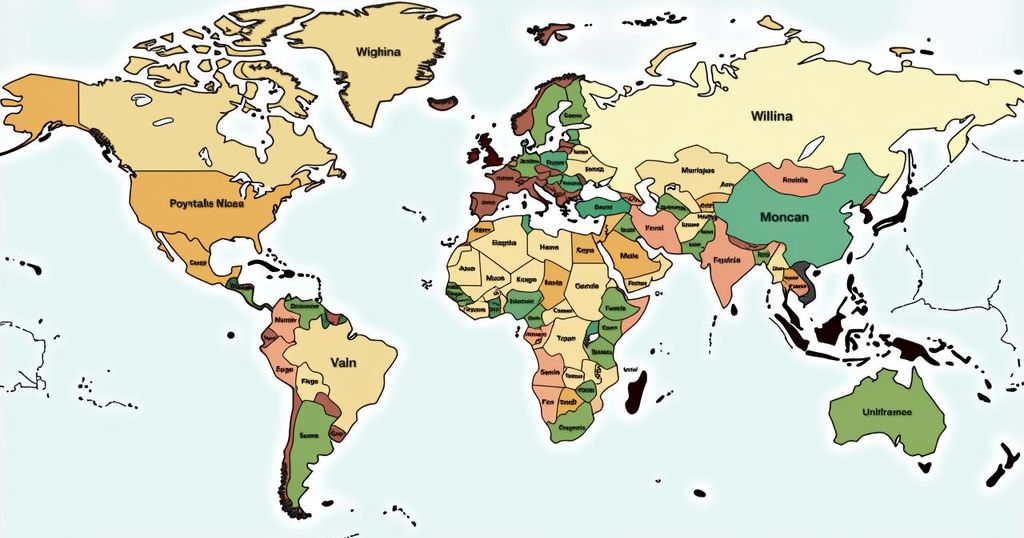A Sustainable Global Universal Basic Income: The Path Forward Through Cap and Share
The advocacy for a sustainable global universal basic income (UBI) is supported by innovative models such as the “cap and share” scheme for fossil fuels. This approach proposes taxing fossil fuel extraction to fund the UBI, addressing both poverty relief and climate change simultaneously. Research indicates significant potential revenue generation that could support monthly payments for individuals, particularly benefiting those in extreme poverty. Establishing a Global Commons Fund would ensure the sustainability of this initiative while promoting ecological preservation.
The pursuit of a sustainable global universal basic income (UBI) is not only achievable but also essential for social equity and environmental justice. A model proposed by the nonprofit Equal Right illustrates a feasible path to implement a global UBI through a “cap and share” mechanism targeting fossil fuels, which simultaneously addresses the pressing issue of climate change. During the World Meeting of Popular Movements, Pope Francis reinforced the necessity for a global UBI, framing it as a measure of compassion and justice that aligns with the fight against economic exclusion and inequality. This advocacy is gaining traction globally, advocating for the redistribution of resources through unconditional cash payments that ensure basic needs are met for every individual. The insights from Equal Right’s research, specifically in their paper “Climate Justice Without Borders,” highlight a significant solution to the financial concerns often raised by critics of UBI. They propose imposing a charge of $135 per ton on the extraction of fossil fuels, which could generate approximately $5 trillion annually. This revenue could support a UBI of at least $30 per month per person worldwide. Moreover, implementing a progressive wealth tax on the world’s wealthiest individuals could yield an additional $22 per person, while a minimal financial transactions tax of 0.1% could generate a further $16. It is acknowledged that while a monthly payment of around $70 may not drastically change lives for many, it has the potential to be transformative for the 712 million people globally who currently live in extreme poverty. Evidence from pilot programs in various countries has illustrated the societal benefits derived from cash payments. While taxation on carbon and wealth can provide initial funding for a global UBI, its sustainability requires careful consideration, particularly as emission levels decrease and wealth distribution becomes more equitable. This necessitates the establishment of a Global Commons Fund (GCF). This fund, proposed by Equal Right, aims to harness revenues from fossil fuel charges, invest in a green economy, and distribute UBI as dividends to citizens while breaking the cycle of debt for poorer nations. Initial funding from wealthier countries could catalyze the establishment and self-sustainability of this fund within approximately two decades. Additionally, a global cap on carbon extraction, aligned with scientific recommendations to curb global temperature increase, is critical. Fossil fuel companies would be charged for extraction activities under this cap, ensuring that the model does not incentivize further exploitation of natural resources. The successful implementation of a UBI also has the potential to combat climate change; examples from programs in India and Peru demonstrate how financial assistance can lead to cleaner energy choices and conservation efforts. This intertwining of climate and economic justice underscores the holistic benefits of the proposed “cap and share” system. As global discussions advance toward COP29 and the attainment of the Paris Agreement’s goals, Equal Right emphasizes the importance of considering this innovative approach. The “cap and share” model is a pivotal strategy to enable a global UBI, curtail fossil fuel dependency, and secure a sustainable future for all citizens.
The concept of universal basic income (UBI) has evolved into a significant topic of social and economic discourse, with advocates recognizing it as a key factor in addressing poverty and inequality. Many developing nations struggle with insufficient fiscal resources, an outcome attributed to historical exploitation by wealthier nations. Thus, implementing a UBI at a global scale presents a dual challenge: alleviating poverty while addressing systemic inequities created by colonial histories and resource extraction practices. The intersection of UBI and climate justice indicates a need for innovative funding mechanisms that promote sustainability and equity in a rapidly changing global landscape.
In conclusion, a global universal basic income can be funded sustainably through the proposed “cap and share” model which taxes fossil fuels and wealth. This approach not only addresses urgent climate concerns but also promotes economic equity by redistributing wealth to those in need. Establishing a Global Commons Fund would further enhance this initiative, helping to alleviate poverty and maintain environmental sustainability. Pope Francis’s advocacy for UBI highlights its importance as a matter of justice and compassion, while the increasing global movement underscores its necessity for a more equitable world.
Original Source: www.aljazeera.com




Post Comment